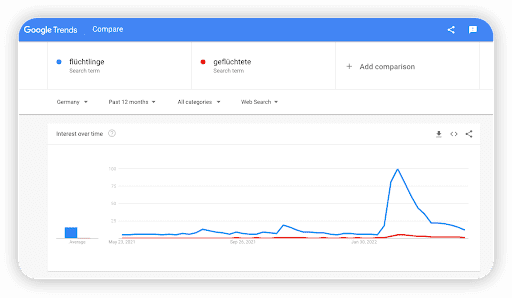Reach more people with the right Google ads
- 29. July 2022
Extend your reach with Google Ads and Google Ad Grants
With greater reach comes greater effectiveness. With greater effectiveness, organisations are more successful in making a difference in the world – the goal of every NGO. Google ads make it easier to achieve this goal. Google offers the possibility to place ads via the search engine, which are played out when the search query matches certain keywords. The display of the ads is based on a bidding process, which bears different costs depending on the keyword and the quality of the performance surroundings, such as landing pages. Here, Google accommodates the non-profit organisations and provides them with a budget of up to 10,000$ per month within the framework of the Google Workspace for Nonprofits to place their ads. These are the so-called Google Ad Grants. According to Google, Google Ads and Google Ad Grants do the same thing. However, our experience has shown that there are important differences that need to be considered.
Google Ad Grants Essentials Advertising on Google can be very costly. That’s why nonprofits have the opportunity to apply for Google Ad Grants. Simply put, Google Ads is an advertising platform and Google Ad Grants is the funding programme that allows nonprofits to use the platform for free. This opens up the opportunity for nonprofits to increase their visibility through targeted ads. Although technically they work in exactly the same way, the main difference between Google Ads and Ad Grants is performance. In addition, the free version has certain restrictions and stricter guidelines.
1. Google Ad Grants has a limited budget.
The daily marketing budget is limited to $329 per day and $10,000 per month. You can also bid a maximum of $2 per click. To work around the budget limitations, you need to enable Conversion Tracking so that CPC bids are set based on the conversion target and can be higher if necessary. With an Ads account, you set the limit of your spending, which is calculated from the cost per click – so you pay according to clicks made.
2. Google Ad Grants only allows Search Ad campaigns.
Google Ads offers different types of campaigns, such as Search Ads, Display Ads and Video Ads. However, only ad formats that consist of text and are played out in the search engine are available for Ad Grants users. These are displayed in the Google search results above and below the organic search results, but always below ads that were placed via Google Ads.
3. The quality score of the keywords must be >2.
To measure the quality of the ads, a quality score is calculated at keyword level on a scale from 1 to 10. The score expresses the extent to which your ad and landing page are more relevant and helpful than those of your competitors when prospects search for your keyword. Keywords with a score of 1 or 2 must be paused or removed. Check your keywords and adjust them if necessary.
4. Your Grants account must have a click-through rate of at least 5%. This means that 5% of the people who see your ad must click on it. If you fail to meet these standards, the ad will be dropped. However, there is an exception if this value balances out with a value of other ad groups that is higher.
5. Google Ad Grants do not allow bidding on single keywords. Single keywords offer the most traffic and are particularly important in the context of a crisis. If you cannot bid on the keyword “Ukraine”, you may lose donations. However, if you focus your campaign on qualitative traffic by targeting longer and more specific keywords such as “donate Ukraine”, you can benefit from this.

The importance of the right keywords
On average, Google processes over 8.5 billion search queries per day (source: Oberlo). It is almost certain that a significant proportion of these queries come from potential supporters who are interested in your organisation. So how can you expand your reach and stay visible in this competitive environment? By placing ads that position themselves well based on the appropriate keywords. Whether and how an ad is placed is based on an auction that takes place for every search query that runs on Google. If a user searches for a term that matches the keyword of the ad, the ad can participate in the auction – provided it meets certain criteria. If the ad does not meet these criteria, it is removed from the auction. The quality of the ads plays an important role. Here, for example, we look at what the ad says or how the user experience with the landing page is: Do the keywords of the ad match the landing page at all? Often, the interaction of the ad with the corresponding landing page is neglected. In order to maintain internal wording, technical terms or even political sensitivity, organisations often overlook thinking of keywords that interested people would actually use to search for their own organisation. For example, if the organisation is active in the field of helping refugees, the keyword “accommodation for refugees” (6,690,000 search results) would make sense. However, the chances of achieving a greater reach can be significantly increased if you include the keyword “refugees” (22,600,000 search results). Take advantage of this issue! For example, by sharing your concern in a corresponding landing page where you educate about the terminology and in turn get new leads.

The dilemmas of booking
in a crisis context, due to their news value. It is clear that Google is the biggest profiteer. So should non-profit organisations support this? Yes! It is important for organisations to include such relevant keywords, otherwise they will miss out on the chance of relatively secure conversions. The second dilemma for NGOs arises when they book the same keywords as their competitors. On the one hand, a distinction is made between booking on the brand names of other NGOs and, on the other hand, booking on generic keywords that can also affect other nonprofits. Booking generic keywords such as “donate” occurs naturally and can hardly be avoided However, it is different when booking on brand names. Especially in the commercial sector, it is well known that brands bid on the brand names of their competitors and accept a bidding war that is associated with high costs. At first glance, this seems to make sense: in this way, they grab some of their competitors’ traffic. From an ethical point of view, however, non-profit organisations should distance themselves from this procedure.
After all, they are all basically working for a similar purpose and have less of a profit-oriented goal than a charitable one: to make the world a better place.

Google Ads and Google Ad Grants in interaction – insider knowledge
Non-profit organisations should definitely take advantage of the opportunity to place free Google Grants ads. With the appropriate landing page, they can increase their visibility, strengthen the perception of their projects, gain supporters and, in the ideal case, even generate donations. What we know by now: Despite Google’s statement to the contrary, there is a clear difference between the performance of ads via Google Ads and Google Grants.
There is a clear difference between the performance of Google Ads and Google Ad Grants – the latter perform much worse. Therefore, we at getunik advocate that NGOs additionally place paid Google Ads. To do this, however, you need to create two different accounts.
Google Ad Grants can be understood as a tool with which smaller goals can be achieved, such as more visitors to the website or greater awareness of a certain topic. Google Ads, on the other hand, is aimed more specifically at larger goals, so-called macroconversions, i.e. donations. Setting up both accounts for optimal interaction can be complicated. We recommend first reviewing the goal of the Grants campaigns and adjusting it if necessary before Paid Ads are switched on. Please also consider the five steps for a successful campaign. Through appropriate testing and monitoring, the campaigns can be better positioned. With Google Ad Grants, we test different keywords or campaigns, to make them more creative in terms of text without losing money. If the performance is good, then it is worthwhile to use Google Ads. It therefore makes sense to run campaigns with the same topic via Google Ads as well as via Grants. But be careful: it is important to book in different keywords so that the campaigns in the different accounts do not compete with each other. And don’t forget to optimise your landing page!
And what does that look like from a practical point of view?
In times of crisis, non-profit organisations face the challenge of acting quickly. One possible way is to run ads quickly, whether for fundraising or awareness. We support our clients in adapting their campaigns to this urgency. Read our case study on how we went about creating Google ads in times of crisis.
You want to run ads for your organisation via Google Ad Grants and need help with registration? Or do you want to introduce Google Ads and want to optimally align your accounts? Then contact us. We will be happy to advise you!
Would you like to learn more about how you can increase your donation income? Then get in touch with us. We are happy to advise you!
